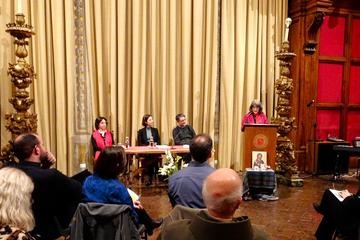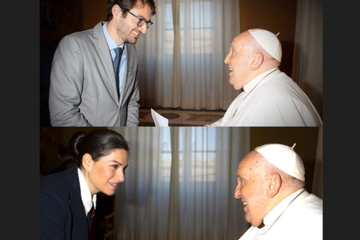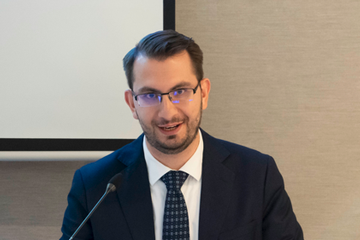
By Paul Geck
ROME — Paul Geck spent a year at the Pontifical Gregorian University while a theology student at the University of Heidelberg in Germany. However, his sincere friendship with other Christians he met in Rome and his profound spiritual experiences led him to extend his stay.
The 27-year-old was one of two young people to share their meaningful ecumenical experiences at an event co-organized by The Lay Centre and Centro Pro Unione for the Week of Prayer for Christian Unity last month. The event included a conference by ecumenist Dr. Paula Gooder on the theme, “Walking on the Way: Accompanying young people on the journey towards Christian Unity.” Read Geck’s inspiring testimony below.
There is a phrase in Dietrich Bonhoeffer’s book, “Life Together,” that goes like this: “Because God has already laid the only foundation for our fellowship, because God has bound us together in one body with other Christians in Jesus Christ, long before we entered into common life with them, we enter into that common life not as demanders, but as thankful recipients.”[1]
This is profoundly true, and I want to share with you only a little part of my thankfulness for what God has given me as a gift in living with other Christians.
I come from a deeply Protestant German family, with a long line of Lutheran pastors among my ancestors. I grew up in what you might call an Evangelical church that I attended with my parents and siblings — very much low church. For us, Rome would have been on the other side of the moon.
I started studying theology at the University of Heidelberg and was offered, towards the end of my studies, the opportunity to go to Rome for a year. So I did, and, as it must happen, I fell in love with the city immediately.
I took some courses at the Gregoriana, though I’d have to admit that life outside the university walls was much more interesting. I was delving deeply into a fascinating cosmos of religious communities, monasteries, meeting lots and lots of interesting people.
And I found a friend, Andrea, who soon turned out to be a brother. In him, a southern Italian Catholic who seemed to know everything about masses, liturgies, popes and councils, I discovered the very same love for Christ, the same search for authenticity, for a life captured by beauty and truth.
He soon introduced me to the community of Augustinian nuns at the Monastery of Santi Quattro Coronati near the Coliseum. And the same discovery here: We’re the same! We’re brothers and sisters of the same Father. But we’re so different! And that intrigued me. So I started to go there regularly, to pray the Psalms with them, to find out more about their life behind the big walls. I started to attend Mass on Sunday. And I felt interrogated by everything. And so my curiosity led me right into a process of what they call here a “vocational discernment,” something I have deeply missed in my own training. It is a profoundly unsettling experience. Who am I, if I am not the German, the theology student, the future pastor? I even started what they called spiritual exercises in daily life — I thought, what do I have to lose? I keep finding out there is quite a bit to lose. And the strangeness of a foreign country, of the faith, the church, of the radicalness of these courageous and beautiful nuns, it all serves as an invitation to look behind the things, especially of my own story and my own tradition, of everything I have taken for granted until now.
But you can’t know how happy I am. I know to be right at the place where God wants me. It’s a time of grace, of discoveries, of widening, of receiving.
The thing about ecumenical encounters, as I found out, is that they can change you. I like the phrase of Pope Francis in “Evangelii gaudium”: “It is not just about being better informed about others, but rather about reaping what the Spirit has sown in them, which is also meant to be a gift for us.”[2]
Among these gifts, I count and cherish the profound humanity of the Catholic faith that makes Incarnation more than a theory. I count the love for the Eucharistic community; I count the treasure of spiritual mothers and fathers that represent the wisdom of the Church. I count the conservation of the monastic tradition, that is in itself a proclamation of healing and wholeness to the world.
I haven’t talked about the pain that arises from our differences — especially in front of the altar. It’s best put by the rule of Taizé that reads: “Never resign yourself to the scandal of the separation of Christians who so readily profess love for their neighbour and yet remain divided. Make the unity of the body of Christ your passionate concern.”[3]
This passion is something else that can only be received as God’s gift. That it has come to be such an important part of my life, is yet another reason for me to be deeply grateful.
[1] Dietrich Bonhoeffer, Life Together, New York 1954, 28.
[2] Pope Francis, EG 246.
[3] The Rule of Taizé, Introduction.


